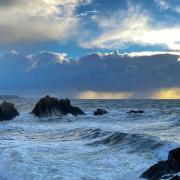It’s 100 years since Sir Ernest Shackleton set sail from Plymouth on an ill-fated polar expedition, as CHRISSY HARRIS reports

As survival against the odds stories go, this one takes some beating.
One hundred years ago this month, Sir Ernest Shackleton set sail aboard the Endurance from Millbay Docks, Plymouth, bound for the Antarctic.
A few months into the journey, the ship became trapped in sea ice.
Rather than admit defeat, Shackleton inspired his men to survive, first by leading them over the ice and then into small boats to Elephant Island, off the coast of Antarctica.

Most stayed there for four winter months, sheltering under two upturned boats in the harshest of conditions.
Meanwhile, Shackleton took five crew members and sailed to South Georgia before trekking across the island’s treacherous mountains to raise the alarm.
All of the men were eventually rescued, two years after they left Plymouth.
In celebration of the astonishing display of courage, the Devon and Cornwall Polar Society has teamed up with University of Plymouth to organise a series of events.
The highlight will be an historic re-enactment, complete with tall ship, on the exact day and time the Endurance set sail from Plymouth in August 1914.
“The Shackleton expedition is an incredible but something of a forgotten story,” says Paul Davies, chair of the Devon and Cornwall Polar Society.
“It’s been overshadowed by the Scott polar expedition and of course the First World War was going on at the same time.
“When news broke that all the men in Shackleton’s crew had been rescued, it didn’t really register with people.”
It is hoped the celebrations in Plymouth on 7 and 8 August will help to give this incredible tale the recognition it deserves.
Hundreds of polar enthusiasts and scientists are expected to gather for a series of talks and a special dinner at the Duke of Cornwall Hotel, Plymouth, where Shackleton and his crew spent the night before their ill-fated voyage.
Also in attendance will be some very special guests – direct descendants of Shackleton and his crew.
The Hon Alexandra Shackleton, granddaughter of the explorer, will unveil a plaque marking the centenary of the Endurance expedition at the hotel and later at Millbay docks.
Mr Davies says he hopes the weekend will act as a fitting start to a two-year run of events across the UK in honour of Shackleton, which will culminate in a ceremony at Westminster Abbey in 2016.
“It is very important to us that people in Plymouth, particularly young people, know about this part of their heritage,” he says.n
To book tickets for the talks, call the Duke of Cornwall Hotel on 01752 275850 or visit devonandcornwallpolarsociety.org.uk
The Endurance Expedition:
In 1901, Irish-born Shackleton, a master mariner, was chosen to go on the Antarctic expedition, led by Robert Falcon Scott, on the ship Discovery.
They trekked towards the South Pole but Shackleton became seriously ill and had to return home.
In 1914, he left Millbay Docks on the Endurance to make his third trip to the Antarctic.
He wanted to cross the Antarctic from the Weddell Sea to the Ross Sea, via the South Pole.
The Endurance became trapped in the Weddell Sea ice, was then crushed and sank.
The crew had abandoned ship and Shackleton inspired them to survive on the floating ice in treacherous conditions.
In April 1916, they set off in three small boats, eventually reaching Elephant Island.
Taking five crew members, Shackleton later went to find help.
In a small boat, the men spent 16 days sailing across the notoriously dangerous Southern Ocean to reach South Georgia.
They then trekked across the island’s mountain range (which had never been crossed before) with no equipment.
They eventually made it to a whaling station and raised the alarm.
Shackleton, showing remarkable leadership qualities, then accompanied a rescue boat to retrieve the 22 stranded men on Elephant Island.
Not one member of the expedition crew died.
They returned home in 1916 but with the news dominated by World War One, the story barely registered.
In a sad twist of fate, many of the men that had survived the Endurance expedition were sent to war and never came home.
Shackleton died of a heart attack off South Georgia in 1922, during his fourth attempt to circumnavigate the Antarctic. He is buried on the island.
Centenary Events:
August 7: Series of talks on the expedition, followed by a centenary dinner at the Duke of Cornwall Hotel.
August 8: Plaque unveiling at Millbay Wharf.
Tall ship departs from Millbay at 12pm. Historic re-enactment by the Antarctic Adventurers group. Display by Plymouth Pipe Band.
Yachts taking part in a Sir Ernest Shackleton Sailing Memorial, being organised by a Polish sailing association, will depart from Plymouth to continue their voyage to the South Atlantic. Boats from all over Europe are taking part.


























